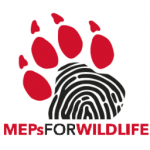On 11th November key wildlife crime experts, representatives from the Commission, national governments and MEPs for Wildlife members’ Benedek Jávor and Pavel Poc came together to examine the very serious and growing problems of the illegal wildlife trade and how the EU can tackle it.
Werner Gowitzke – an expert on Environmental Crime at Europol said a great number of actors are involved in the trade, from unknowing tourist hunters, to organised crime networks. It is a low risk, high profit activity, which hands out low penalties and rarely leads to imprisonment.
Also up until recently wildlife crime has been vastly unreported, meaning it has been able to grow to an extreme level. Pauline Verhej from the Wildlife Justice Commission indicated wildlife crime is now linked to other serious crimes like corruption, trafficking human beings and money laundering.
Stacey McLennan from the International Fund for Animal Welfare asked what the Commission is doing to address e-commerce. Persuading online companies to ban the sale of wildlife products online can be a very effective way to stamp out the trade.
National governments from the Czech Republic, Slovakia and Hungary highlighted the lack of a harmonised enforcement strategy as one of the main reasons the illegal wildlife trade was able to pass through their borders. They called for more international cooperation, better training of enforcement officers and also greater public awareness to tackle the problem.
The head of combating wildlife crime at UNODC Jorge Rios appealed to the EU for political and financial support. Commission representatives indicated that an EU Action Plan would be launched early next year. The Action Plan will introduce a more joined-up enforcement strategy with much improved training for enforcement agencies. It will also ensure that CITES (which is the original agreement to protect endangered species) is fully implemented.
MEPs for Wildlife support the EU Action Plan’s promise to introduce improved enforcement efforts and will be pushing to ensure they are fully implemented. The illegal trade in wildlife products is the world’s fifth most lucrative criminal industry and is pushing some of our planets most beloved creatures to the point of extinction.

